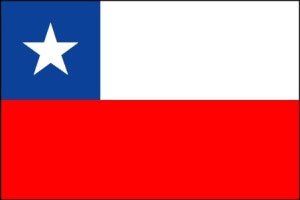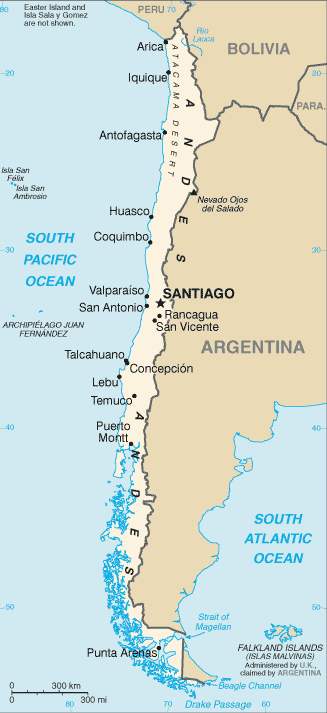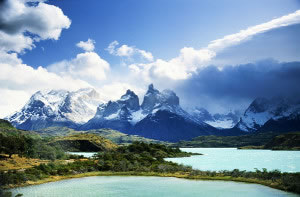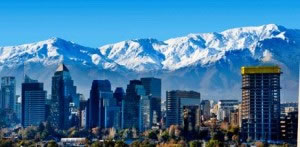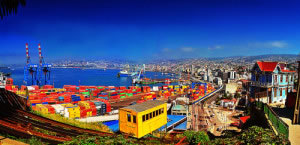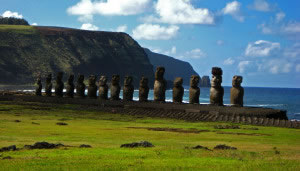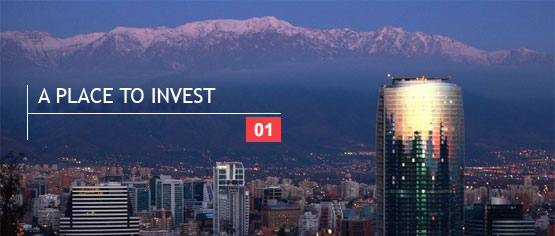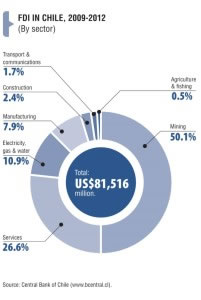Country Feature: Republic of Chile
COUNTRY PROFILE
STATISTICS
| Capital : | Santiago |
| Official language : | Spanish |
| Demonym : | Chilean |
| Government : | Unitary Presidential Republic |
| President : | H.E Michelle Bachelet |
| Independence from Spain: | Declared: February 12, 1818Recognized: April 25, 1844 |
| Current constitution : | September 11, 1980 |
| Land Area : | 756.096,3 km2 – 291.930,4 sq mi |
| Population : | 17.8 million (2014 est.) |
| GDP (PPP) : | Total: US$280.3 billion (2013)Per capita: US$15,889 |
| Religion : | 67.4% Roman Catholic, 16.6% Evangelical, 11.6% None |
| Currency : | Peso (CLP) |
| Climate : | Temperate; dry in the north, wet in the south |
| Weather in Santiago : | Hottest month January 25-30°C, coldest month June 3-14 °C |
| Time : | 4 hours behind GMT |
MAP OF CHILE
Chile, or officially the Republic of Chile, is a country in South America occupying a long narrow strip between the Andes Mountains to the east and the Pacific Ocean to the west. In borders: Peru to the north, Bolivia to the northeast, Argentina to the east, and the Drake Passage in the south.
The Pacific coastline of Chile is 78,563.2 kilometres and Chilean territory includes the Pacific islands of Juan Fernandez, Salas y Gómez, Desventuradas and Easter Island. Chile also claims about 1,250,000 square kilometres of Antarctica, although all claims are suspended under the Antarctic Treaty.
The shape of Chile is a distinctive ribbon of land 4.300 km long and on average 175 km wide. Its climate varies ranging from the world’s driest desert – The Atacama – in the north, through a Mediterranean climate in the center, to a rainy temperate climate in the south.
The northern desert contains great mineral wealth, principally copper. The central area dominates in terms of population and agricultural resources, and is the cultural and political center. Southern Chile is rich in forest and grazing lands and features a string of volcanoes and lakes. The southern coast is a labyrinth of fjords, inlets, canals, twisting peninsulas, and islands.
MARKET OVERVIEW ON CHILE
According to survey conducted by Ernst & Young and Oxford Economics, Chile is among the 25 fastest growing economies in the world with expected GDP for 2014 at more than 4.5%. Furthermore, Chile ranks among the 25 best countries to do business in the Forbes’ list and ranks 37th place in the World Bank list. Chile established itself as a leader among the 40 countries surveyed in Latin America and the Caribbean, followed by Peru and Colombia.
The ranking shows that Chile is an outstanding example of good governance, and that the innovative programs around education, health and infrastructure have significantly reduced poverty, have fostered the growth and population have managed to be one of the most educated and skilled in South America. These results also positioned Chile as an example in the region, an excellent place to invest, especially in times of international economic instability.
Even though Chile’s market is relative small (population: 17.8 million), for the past few years, the country has seen increased middle-class purchasing power and a growing younger, urban population, which are mainly due to the increasing positive trends of income levels, employment rates, availability of consumers’ credit and government incentives to stimulate retail consumption.
Due to the distance, many Malaysian companies are hesitant to do business in South America. However, when looking at Chile, Malaysian exporters must look at the country as a hub to enter the South American markets since Chile is a member of the Rio Group, Southern Common Market (MERCOSUR), Asia Pacific Economic Cooperation (APEC), and Union of South American Nation (UNASUR). Many countries consider Chile an excellent platform for doing business in the region. Currently, the country has 24 Free Trade Agreements with over 60 countries in Latin America, Europe, Asia and North America. Chile has given its 17.8 million citizens unprecedented access to the world’s products and services.
Malaysia-Chile Free Trade Agreement
The Malaysia – Chile Free Trade Agreement (MCFTA) came into force since February 2012. The Agreement outlines commitments from both countries on liberalisation of trade in goods with focus on the 90.2% of product with tariff elimination. Malaysia and Chile will progressively reduce or eliminate tariffs on their respective industrial and agricultural products.
The FTA between Malaysia and Chile, in the long term, offers opportunities to strengthen trade and investment linkages by enhancing each other’s market share in both countries, facilitating two-way investment flows in areas of common interest; and creating potential for Malaysian/Chilean traders and investors to expand to other Asian/Latin American markets. The MCFTA’s Schedule of Tariff Commitment can be viewed at www.miti.gov.my
Malaysia-Chile Trade Performance
The total trade between Malaysia and Chile for 2013 registered a significant growth of 71% from 2012 amounting to RM1.83 billion.
Malaysia’s export to Chile in 2013 recorded a 22.5% growth which contributed to a total of RM516 million. The top 10 Malaysian export to Chile were Electricals & Electronics (E&E) (27.9%), wood products (16.3%), rubber products (12.8%), chemicals & chemical products (11%), manufacturers of metal (5.3%), machinery, appliances & parts (3.8%), palm oil (3.7 %), textiles & clothing (3.4%), processed food (3.3%) and transport equipment (1.4%).
On the other hand, Malaysia’s import from Chile continue to generate significant positive growth of 102.6% amounting to RM1.31 billion in 2013 as compared to RM646.7 million in 2012. The import structures were mainly focused on manufactures of metal which were mainly copper (47.3%), refined petroleum products (32.6%), metalliferous ores and metal scrap (7.1%) and seafood, fresh, chilled or frozen (3.8%).
Trade balance between Malaysia and Chile has always been on Chile’s favour for the past 10 years which is due to the high imports of Chile’s mining goods mainly copper. Malaysia is currently ranked as the 31st import source and 36th export destination for Chile.
Opportunities for Malaysian Businesses
Export:
Chile offers a unique opportunity for Malaysian businesses interested in expanding their businesses in one of the most open and stable markets in Latin America. Malaysia and Malaysian capabilities are still relatively unknown by the Chilean business communities due to stiff competitions from China, USA, Korea and other Latin American countries which are aggressively promoting their products in Chile.
However, Malaysian exports to Chile continue to see double digit growth but more awareness needs to be done to introduce our products in the market. Participation in promotional booths in trade fairs in major events in Chile has proven beneficial to introduce our products into the market and more events should be considered in Latin America as they are focusing their trade now to ASEAN which is a showing of good signs to the opening and reception of our products in the market.
The potential in the Chilean market is limitless however, among the products with the most potential are:
-
Electric and Electronics – The sector continues to be the main export to Chile with export share of nearly 30% from our overall exports to Chile. Main products imported are radio broadcast receivers, telecommunication parts and equipment and sound recorders, electrical machines with individual functions & parts, microwave ovens, other ovens, cookers, cooking platters, grillers, roasters, hybrid integrated circuits and electric accumulators (storage batteries).
-
Healthcare products – Malaysia is currently the top supplier for medical gloves in Chile. The Chile Government’s emphasis on new construction and upgrading of hospitals as part of its 2010-2015 Health Reform Plans boost demand for medical devices, which should account for an increasing proportion of health expenditure. Best products are medical disposables and devices as well as hospital furniture.
- Furniture – Imports of furniture in Chile experienced an annual growth of at least 15%. One of the reasons for the positive growth is mainly contributed from the implementation of the many bilateral trade agreements and Chilean politics are gradually lowering the tariff rates on imported products. This has allowed countries of great industrial and technological development to reach the Chilean market with competitive prices, progressively displacing domestic production. Malaysian furniture products also are highly regarded in Chile for their quality, design and price and Malaysia is currently the top 5 furniture supplier in Chile. Among the best products are dining, bedroom, office and outdoor furniture.
-
Prepared Food, Food Ingredients and Food Packaging – Chilean snacks and confectionery industry represent a total of US$1.65 billion in sales with Chileans spending about US$96 per person per year on candies, snacks, chocolates and ice cream, the highest in Latin America. Among the products in high demand are snacks, biscuits, chocolates and candies. International exposures have Chilean citizens demanding more ethnic food such as spices and sauces, instant noodles, etc… and due to the increase in demand and Chile being one of the biggest agriculture producers as well as having a big food industry in the region, the demand for food ingredients and packaging in the local food sector are increasing. Among the products frequently sourced are cocoa, margarine, shortenings and vegetable fats as well as food packaging equipment and machinery.
-
Construction Equipment and Building Materials – The Construction Chamber of Chile estimates that growth will continue in 2014 with an average 9%. Ongoing reconstruction because of frequent earthquakes, and an increase in investment to increase the supply of public infrastructure and private housing further fuels higher demand in different regions in Chile. Best products are all fixtures and fittings such as floorings, doors, moldings etc…
-
Safety and Security Equipment and System – There is investment growth in many industry sectors in Chile that directly impacting the safety and security industry, such as construction, infrastructure, mining, etc. Also, increased awareness of protection as a means of prevention will maintain the growth of this industry. Among the best products are access control, parking systems, fire detectors, sprinklers systems, extrication equipment, firefighting suits, alarms and monitoring, CCTV, outdoor perimeter protection, locks, safes, sensors, vehicle protection, and general safety gear for industrial use.
-
Mining Industry – Chile is the number one producer of copper in the world. Its current world production market share is 34% and the mining sector contribution to its GDP is approximately 20%. The overall industry represents about 60% of the country’s total exports thus the country is constantly in the need for all products that are applicable to be used in the mining industry such as mining equipment and machinery as well as parts, security and safety products, automotive parts and equipment and renewable energy products and services that helps reduce energy consumption, one of the country’s current priority.
-
Renewable Energy – It is one of the country’s top agendas to conserve their energy usage. Projects such as hydroelectric plants, wind farms and solar panels among others are some of the ongoing projects being implemented especially to generate power for their mining industry and reduce pollution. Among the best prospects are latest technology and service supplies for products related to photovoltaic power generation for industrial, commercial and residential use as well as other products such as solar CCTV, solar spot lighting, solar garden lights, and solar pump systems. Services such as consultancy, design, engineering and OEM manufacturing should be needed in this new order of environmental friendly source of energy options. Joint ventures with Chilean companies are also suggested if companies are interested to participate in the upcoming tenders.
Investment:
Chile has generally recovered from the international financial and economic woes of 2008-2009 as well as the February 2010 earthquake that severely affected the economy in the southern part of the country. The housing market has rebounded, led by earthquake reconstruction projects and a housing boom in the Santiago Metro area. Energy costs continue to be the highest in South America and Chile is searching for all available technology and capital to increase supply through new power plants and promote energy efficiency.
Chile is adept at leveraging private sector involvement in public works projects and infrastructure via the “concession system” and will continue to use this strategy in the years to come. Chile has privatized much of its infrastructure and basic services, such as ports, highways, transportation, and water supply. In addition, there is significant private sector involvement in education, retirement/pensions, health care, and prisons.
Chile has a strong infrastructure project pipeline, with close to US$60 billion in total project value under construction and in planning stage since 2012. These include infrastructure projects, highway/roads, airport expansion, railway, port terminal projects and hospitals/healthcare projects.
For more information on potential investment in Chile, please visit: www.ciechile.gob.cl
Import:
Chile is known as one of the biggest mining and agriculture producers in the world. Among the products and services that are currently imported to Malaysia are copper, seafood such as salmon and shrimps, fresh fruits, meat, wine, dairy products, and prepared food and wheat products such as cereals.
With the growing income in Chile, outbound tourism has increased and there have been growing interest on Asian destinations. However, there are no travel agents here that have packages offered to Malaysia. Interested tour operators in Malaysia should capitalise on this to make contacts with partners in Chile. Even though there are no direct flights to Malaysia, MAS has recently joined the One World airline membership where LAN Airlines is also a member and this provides a good partnership to promote travel and tourism to both countries.
For more information on potential imports from Chile, please visit: www.prochile.gob.cl
About MATRADE
As Malaysia’s national trade promotion agency, Malaysia External Trade Development Corporation (MATRADE) is responsible for assisting Malaysian companies venture into the international market. MATRADE assists Malaysian companies establish their presence overseas through different promotional programmes, including participation in trade missions, specialised marketing missions and international trade fairs as well as through capacity development initiatives.
MATRADE overseas offices assist foreign buyers in establishing links with Malaysian enterprises by furnishing accurate and reliable information on Malaysian companies, products and services. MATRADE connects individual buyers visiting Malaysia with suppliers or potential business partners and provides advice on doing business with Malaysia.

(2nd from left) Ms Ezzwanee Ahmad, MATRADE’s Trade Commissioner with (2nd from right) H.E. Mr Ganeson Sivagurunathan, Ambassador of Malaysia to Chile and MATRADE’S staff at the MATRADE Promo Booth at the Espacio Food 2013, one of the biggest food trade fair in Chile

Opening Ceremony of Malaysia Products and Services Exhibition in conjunction with MATRADE’s Marketing Mission and Malaysia Services Exhibition in Hotel Crowne Plaza, Santiago, Chile in November 2013

Networking with Chambers representatives with (1st from left) Ms Ezzwanee Ahmad, MATRADE’s Trade Commissioner, (3rd from left) H.E. Mr Ganeson Sivagurunathan, Ambassador of Malaysia to Chile, (4th from left) Datuk Dzulkifli Mahmud, Deputy Chief Executive Office , MATRADE
Malaysia Export Exhibition Centre (MEEC) is a permanent displaying centre at MATRADE, showcasing Malaysian products and services. Business meetings are arranged for international buyers to meet with Malaysian companies displaying their products and services at MEEC, a one stop sourcing centre. To give Malaysian companies the competitive edge in international trade, one of MATRADE’s main services is to disseminate timely and relevant information as well as market intelligence to Malaysian companies. MATRADE Portal, www.matrade.gov.my provides extensive information to both the foreign and local business communities that are useful for enhancing business opportunities.

Tourism Fair – The Embassy of Malaysia in Chile and MATRADE Santiago promoting Malaysia’s tourism and handicraft products at the Feria de las Naciones 2013, an arts and culture fair in Chile

Delegation from the MATRADE’s Marketing Mission and Malaysia Services Exhibition 2013 at the Ambassador of Malaysia residence in Santiago, Chile

(2nd from left) Ms Ezzwanee Ahmad, MATRADE’s Trade Commissioner with producers from Canal 13. Canal 13 is one of most popular TV channel in Chile. They have also visited Malaysia in April 2014 to do a feature on Malaysia’s trade and tourism industry for a local travel programme in Chile.
In addition, the exporting community can also retrieve trade information from the Business Information Centre (BIC) at MATRADE office in Jalan Duta. The centre has a vast collection of international trade and business materials in both printed and electronic format. BIC also has a comprehensive collection of trade publications, online databases, CD-ROMs and audio-visual materials to assist companies undertake market research for export.
MATRADE Santiago oversees all export promotions in 7 countries in South America’s Southern Cone namely Chile, Peru, Ecuador, Bolivia, Argentina, Uruguay and Paraguay. For more information on the markets and potential importers, please contact us at:
MATRADE Santiago
Address : Oficina Comercial de Malasia (MATRADE)
Avda. Tajamar 183, Ofc. 302, Las Condes, Santiago, Chile
Tel : +56-2-2234 2647
Email : santiago@matrade.gov.my
Website : www.matrade.gov.my
Trade Commissioner : Ms. Noor Ezzwanee Ahmad
Marketing Officer : Ms. Raquel Saavedra
Chile : Land of Opportunities
The Foreign Investment Committee (CIEChile) is the agency that represents the State of Chile in its dealings with foreign investors and helps to position Chile as a highly attractive destination for foreign investment and international business through its role in matters related to the administration and communication of the corresponding legal norms, the development of promotional activities of different types and the preparation of information concerning foreign investment for investors and potential investors.
Decree Law (DL) 600 is a mechanism for the entry of capital into Chile. Under this regime, whose use is optional, foreign investors bringing capital, physical goods or other forms of investment into Chile may ask to sign a foreign investment contract with the State of Chile.
Since 1974, the majority of foreign investors have chosen to use this mechanism. By 2011, foreign investment worth almost US$82.0 billion had been materialized through D.L. 600, representing 56.5% of the foreign capital effectively entering Chile during that period.
DL 600 can be used by:
a) Foreign individuals.
b) Foreign legal entities including:
• Companies (in any of their legal forms)
• Corporations and foundations
• Foreign states
• International organizations
c) Chilean individuals and legal entities domiciled abroad.
Under this optional regime, foreign investors bringing capital, tangible assets or other forms of investment into Chile can request to sign a Foreign Investment Contract with the state of Chile.
10 Reasons to Invest in Chile
1) SOLID
Chile has sustained economic growth and social progress, with stability, transparency and competitiveness and excellent business prospects that position the country not only as the best destination for foreign investment in Latin America and but also as one of the world’s leading destinations. According to the World Investment Report 2013 released by the United Nation Conference on Trade and Development (UNCTAD), Chile was the world’s 11 largest recipient of foreign direct investment in 2012. With a record in-flow of US$30,323 million, Chile was among the top 20 recipients for the second consecutive year, rising from 17 place in 2011 to 11 place in 2012.
In the eight years from 2005 to 2012, Chile’s GDP grew at an average annual rate of 4.6%, according to the Central Bank of Chile. In 2012, in the midst of the European debt crisis, Chile’s economy demonstrated its resilience to adverse international conditions and GDP expanded by 5.6% to US$268,413 million. As a result, per capita income reached US$15,410 and, in purchasing power parity terms (PPP), US$18,419, according to figures published by the International Monetary Fund (IMF) in April 2013.
2) RELIABLE
Chile is a safe and reliable place in which to do business. This is borne out by risk ratings agencies which have maintained their high ratings for Chile, highlighting its low level of public debt, the health of its financial system and its solid institutions.
In 2012, Chile was the market that saw the fifth largest improvement in its risk rating. According to Bloomberg, 5-year credit default swaps (CDS) for Chile’s debt dropped by 27.9% to 95.4 points, positioning it as the eighth least risky country in the world and the safest in Latin America.
3) COMPETITIVE
Chile has a consolidated position as Latin America’s most competitive economy. This is mainly due to its sustained economic growth and openness to trade which have set it apart internationally as a free and dynamic market. Its performance is reflected in the rankings of institutions that annually measure competitiveness around the world.
Chile obtained its best scores for government efficiency and economic performance, putting it in top position within Latin America and a high 18th position among economies with less than 20 million inhabitants.
4) ATTRACTIVE BUSINESS CLIMATE
Thanks to its political and economic stability, openness to trade, legal security and excellent growth prospects, Chile has maintained an attractive and dynamic business climate for investors.
Chile is also an attractive country in which to do business because of its high level of free trade. It is, indeed, one of the world’s ten freest countries, according to the Index of Economic Freedom 2013, published by the Heritage Foundation and the Wall Street Journal.
5) TRANSPARENT
Chile is known for its transparency and this is reflected in international rankings that highlight the low level of corruption in the country and, particularly, its finances, due to government efforts to raise standards in administration of the state.
6) INTEGRATED
Chile’s open economy, combined with an active policy of bilateral, regional and multilateral trade agreements, has underpinned a sustained increase in foreign trade in goods and services and in the country’s international competitiveness, consolidating its position as an active international partner.
7) WIRED
Chile is a country that, from primary schools through to businesses and public services, is ready to adopt new technologies. Numerous studies, in fact, identify Chile as a “wired” country that has already achieved important progress as regards digital connectivity and information and communications technologies (ICTs).
8) TALENTED
Foreign investors often highlight human capital as one of Chile’s main comparative advantages, drawing attention to the high standards achieved by the country’s universities and, particularly, its business schools.
In line with Chile’s progress as regards educational indicators, the country’s labor force reached a total of 8.2 million people in the first quarter of 2013 out of whom 93.8% were employed, including over 64% in the services sector.
9) QUALITY OF LIFE
With a geography that contains a privileged variety of landscapes, Chile offers visitors from overseas a perfect mixture of natural beauty, public safety, political stability and modern infrastructure. These characteristics together make it one of the best places in which to live in Latin America.
10) HQ IN CHILE
According to the UBS investment bank, Santiago is one of the world’s 15 least expensive cities for the installation of foreign companies. In its 2012 Price and Earnings Report, the Chilean capital obtained 52.8 points, taking 60th position out of 72 cities in the ranking where first place indicates the most expensive city (Oslo) and New York is the basis of comparison (100 points). The report considers the cost of a basket of 122 goods and services according to European consumption habits and including three rent categories.
As well as the low costs of starting a business, Chile also offers advantage as regards access to private financing.
INVESTMENT OPPORTUNITIES IN CHILE
Chile offers attractive investment openings in sectors that include mining, services, the food industry, infrastructure, tourism and energy.
MINING Chile is the world’s principal producer of copper (32%), nitrates (100%), iodine (58%) and lithium (45%) and the sixth largest silver producer. There are opportunities in Equipment and spares, Engineering and consultancy services, construction, production support services and establishment of regional offices by mining suppliers as base for exporting and diversifying areas of activity.
ENERGY In 2012, hydroelectricity (excluding mini-plants of less than 20 MW) accounted for 29.3% of generation, coal for 41%, gas for 19%, diesel for 5.9% and alternative renewable energies (ARE) for 4.8%. As a result, 65.9% of the country’s electricity was generated from fossil fuels. The country’s projected economic growth implies increased demand for electricity which is forecast to rise by around 5% a year through to 2020, creating opportunities for investment in generation and transmission. There are opportunities for power generation where over 8,000 MW will be required by 2020 and development of alternative renewable energies.
INFRASTRUCTURE Chile has a portfolio of public tenders worth US$7,000 million that includes highways, airports, hospitals and urban infrastructure.
TOURISM 3,554,279 overseas tourists visited Chile in 2012, up by 13.2% on 2011. Spending by overseas tourists in Chile rose by 17.1% to US$2,712.6 million. In the last ten years, the portfolio of investment projects in the sector reached US$528 million (2003-2013 according to FDI Markets). Opportunities are available for development of hotel and leisure projects, development of sustainable tourism in protected areas under state concessions and development of special interest tourism projects.
Extracted from http://www.ciechile.gob.cl/en
Contact:
CIEChile Foreign Investment Committee
Ahumada 11, 12th Floor – Santiago, Chile
Tel: (56-2) 2663 9200
Email: info@ciechile.gob.cl

